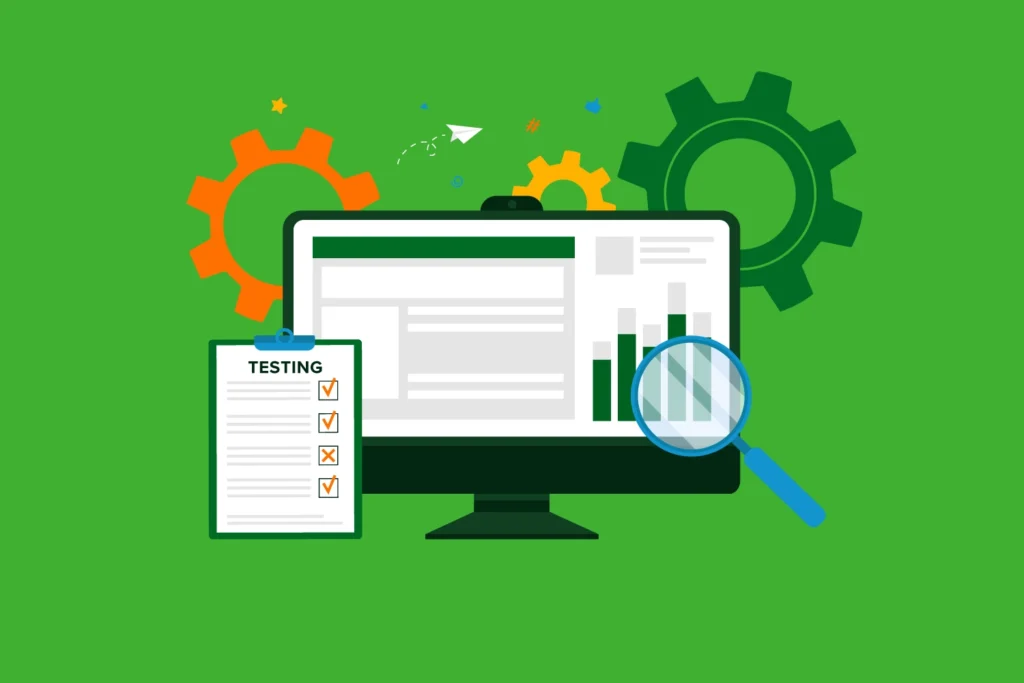Disclaimer: The articles published here on the City of Eau Claire Economic Development Division website are meant to be a helpful starting point as you explore doing business in our community. They’re not the final word on requirements or what’s best for your unique situation. We always recommend checking in with legal, financial, or other professionals for advice tailored to your business.
Every growing business reaches that turning point—when the workload outgrows your capacity, and it’s time to bring in help.
For first-time entrepreneurs, that’s a big deal. It means your customer base is growing, and your business is ready to take on the next chapter. But hiring your first employee also comes with new responsibilities, such as payroll, taxes, and workplace laws. The good news is it can all be manageable once you know the steps.
Here’s a simple guide to help Eau Claire business owners navigate the hiring process, stay compliant, and build a team that helps your business thrive.
1. Get Set Up as an Official Employer
Before you bring someone on board—whether it’s a part-time assistant or a full team—you’ll need to register as an employer with both federal and state agencies if you haven’t already. These early steps lay the groundwork for payroll, taxes, insurance, and everything else that comes with having employees.
That process typically involves:
Getting an EIN (Employer Identification Number) from the IRS
Think of this as your business’s Social Security number. You’ll use it for everything from filing payroll taxes to opening bank accounts. Applying online is quick and free.
Registering with the Wisconsin Department of Revenue
This sets you up to withhold Wisconsin income taxes from employee paychecks. If you’re already registered for sales tax, you might just need to add withholding to your existing account.
Registering with the Wisconsin Department of Workforce Development (DWD)
You’ll need to report new hires and contribute to unemployment insurance, which helps protect employees if they lose their jobs. Most Wisconsin employers are also required to carry worker’s comp coverage, but more on that in a minute.
Setting Up Payroll Tax Accounts
You’re now responsible for collecting and submitting payroll taxes, such as:
- Federal and state income tax withholdings
- Social Security and Medicare contributions
- Unemployment insurance payments
- Quarterly and annual payroll filings
Checking for Other Licenses or Requirements
Depending on your industry, there may be additional rules too. For example, hiring minors comes with specific restrictions, and fields like construction or food service may require added insurance or certifications.
If this feels like a lot, most of these are one-time setup tasks. Tackle them early, and you’ll save yourself a lot of stress down the road.
2. Understand Employment Laws
You don’t need to become an HR expert overnight, but you do need to understand the basics of employment law, especially when it comes to protecting both your business and your employees.
Here’s what to keep in mind:
Wages & Hours
Wisconsin’s minimum wage is $7.25/hour, but many Eau Claire businesses pay more to stay competitive. Be sure to follow overtime laws too; most employees must be paid time and a half for anything over 40 hours a week. And if you’re hiring minors, there are limits on how many hours they can work and when. The Wisconsin DWD has a helpful guide on youth labor laws.
Anti-Discrimination Laws
Federal and state laws prohibit discrimination based on race, age, gender, religion, disability, and more. That means your hiring process, promotions, and workplace policies must all be fair and consistent. Even if your team is small, it’s smart to have clear anti-harassment policies in place.
Employee Classification: W-2 vs. 1099
Just because someone prefers to be a contractor doesn’t mean they qualify as one. If you control how and when the work is done, they’re likely a W-2 employee. Misclassifying workers can lead to costly fines and back taxes, so it’s important to get this right.
Required Workplace Posters
Yes, those breakroom posters are legally required, and not just for big companies. Wisconsin employers must display notices about minimum wage, family leave, and other employee rights. And no, you don’t have to pay for them unless you want to order printed copies; otherwise, you can download them for free from the Wisconsin DWD and print them yourself.
If you’re already feeling overwhelmed, the Wisconsin DWD offers plain-language guides, checklists, and even one-on-one help to walk you through your responsibilities. When in doubt, ask them questions early; it’s easier than fixing mistakes after you’ve already started hiring.
🔗 Start Here: Wisconsin Department of Workforce Development ›
3. Don’t Forget About Payroll & Withholding
Now that you’re officially an employer, it’s time to handle payroll, which is more than just cutting a check. You’re responsible for withholding the right taxes, filing reports, and paying your share of payroll-related taxes. Even with one employee, it’s important to get this right from the start.
Federal & State Income Tax Withholding
Based on each employee’s W-4, you’ll withhold federal and state taxes and send them to the IRS and the Wisconsin Department of Revenue, typically every month or semi-weekly, depending on your payroll size.
Employer Payroll Taxes
You’re also now responsible for:
- 7.65% of each employee’s wages for Social Security and Medicare (FICA)
- Federal unemployment tax (FUTA)
- Wisconsin unemployment insurance (SUTA), which varies by industry
Payroll Records & Reporting
You’ll need to:
- File quarterly IRS forms (like Form 941)
- Submit annual W-2s and W-3s
- Report new hires to the Wisconsin New Hire Registry
These reports help you stay compliant and give you insight into your labor costs over time.
So, who handles payroll? Consider these options:
- DIY Payroll: If you’re detail-oriented and comfortable with tax rules, you can manage it in-house with software or spreadsheets.
- Payroll Software: Platforms like Gusto, QuickBooks Payroll, and ADP automate much of the process and are small-business friendly.
- Hire a Pro: Many local accountants and bookkeepers in Eau Claire offer payroll services, or they can refer you to someone who does. It’s a popular option for peace of mind.
4. Know the Costs Beyond Just Wages
Paying an hourly wage or salary is just one part of hiring. There are several other costs to consider, and planning for them upfront will help you avoid surprises later.
Payroll Taxes
We already mentioned this, but in addition to withholding taxes from your employee’s pay, you’ll pay:
- 7.65% for Social Security and Medicare
- Around 0.6% for Federal Unemployment Tax
- Wisconsin Unemployment Insurance (Rates vary)
Worker’s Compensation Insurance
Most employers in Wisconsin are required to carry worker’s comp insurance. Rates depend on your industry and risk level, and coverage is available through private insurers or the state’s insurance pool.
Training & Onboarding Time
Even if training is informal, onboarding takes time, and time is money. You or another team member will likely spend a few hours getting your new hire up to speed. Planning for this helps you budget realistically.
Future Benefits
You might not be offering health insurance or retirement plans yet, but it’s good to think ahead. As your business grows, benefits can help you attract and retain great employees.
Common offerings include:
- Health, Dental, or Vision Coverage
- Paid Time Off (PTO)
- Retirement Contributions (like a SIMPLE IRA or 401(k))
- Bonuses or Stipends
Even if benefits aren’t in the budget today, knowing your options helps you prepare for the future.
5. Post Jobs in the Right Places
Once you know who you’re looking for and what you can offer, it’s time to spread the word. And in Eau Claire, there are lots of ways to connect with local talent.
Job Center of Wisconsin
This free statewide job board is run by the Wisconsin DWD and is widely used by job seekers in the region. There, you can post openings, browse résumés, and connect with workforce specialists.
Local Colleges & Universities
Looking for interns or entry-level help? Tap into the student talent at local universities. Both schools have career services teams ready to help local employers connect with students and grads.
- University of Wisconsin-Eau Claire (UWEC) – Ideal for roles in business, tech, healthcare, and more
- Chippewa Valley Technical College (CVTC) – Great for skilled trades, healthcare, IT, and hands-on roles
Online Platforms
- Indeed – Widely used with free and paid options
- LinkedIn – Best for professional roles
- Facebook/Instagram – Great for local reach; use your business page or post in Eau Claire-specific groups
And Don’t Forget Word-of-Mouth
Sometimes, your next great hire is a regular at SHIFT Cyclery & Coffee Bar or someone chatting at the Eau Claire Downtown Farmers Market in Phoenix Park. In Eau Claire, personal referrals go a long way, so don’t be shy about mentioning you’re hiring.
6. Create a Great First Day (& Beyond)
Hiring the right person is a big win, but what happens next matters just as much. A thoughtful onboarding experience helps new employees feel welcomed, supported, and excited to be part of your business.
Start strong by:
- Writing a Clear Job Description: Even if you discussed the role during interviews, a written list of responsibilities helps everyone stay on the same page and provides a solid reference point down the road.
- Setting Expectations & Goals: Outline what success looks like in your new employee’s first 30, 60, or 90 days. Simple, clear goals give them a sense of direction and purpose.
- Sharing Your Culture & Values: Help them understand what makes your business tick—whether it’s fast-paced service, teamwork, or community involvement. Let them in on the little things too, like Friday donut runs or afternoon walks on the river trail.
- Checking In Often: Touch base regularly during those first few weeks. A quick chat at the end of the day can go a long way in answering questions, resolving issues, and showing support.
Why Onboarding Matters
Happy, informed employees are more likely to both thrive and stick around. In a city like Eau Claire, where it’s small enough that relationships matter and word of employee experiences—good and bad—can travel like wildfire, that kind of loyalty and word-of-mouth goes a long way.
Wrapping Up
Hiring employees is a major milestone and a strong sign your business is on the move. With the right preparation and local support, you’ll be ready to build a team that helps your Eau Claire business thrive.
Article Cover Illustration by Freepik





